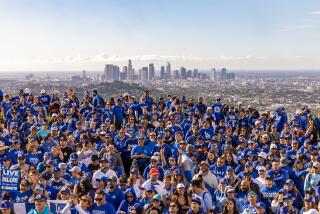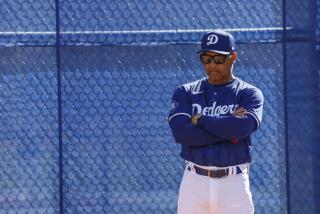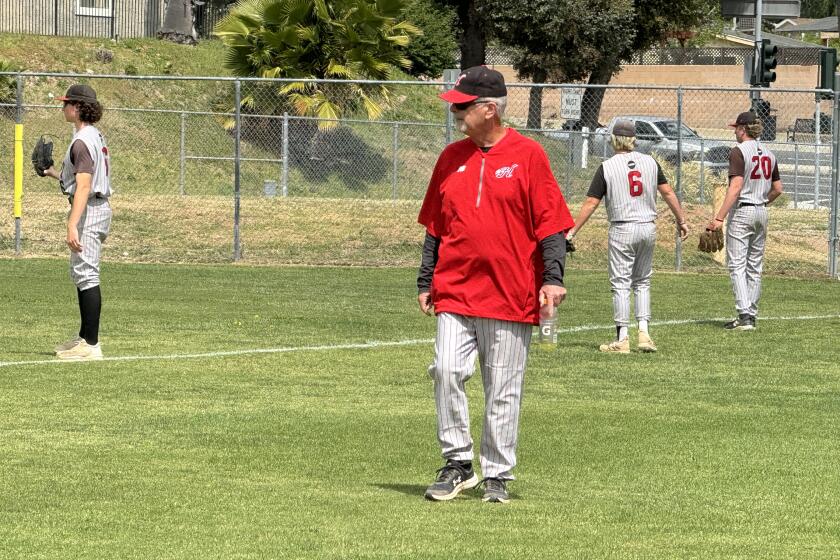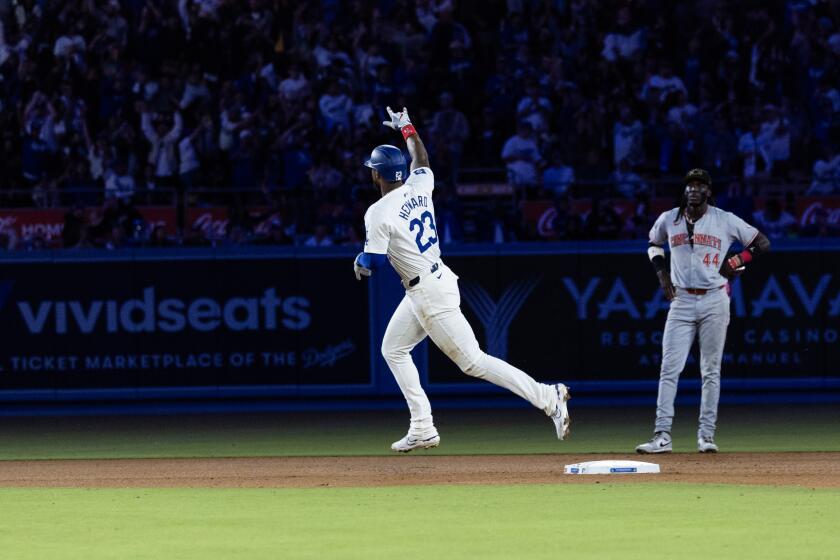Q&A;: For Dodgers’ Ned Colletti, there is power in giving
On a typical game day, Dodgers General Manager Ned Colletti is in his Dodger Stadium office or around the premises from 9 a.m. until 1 a.m.
That’s the only way Colletti says he has known how to operate since scuffling from a childhood in a poor but tight community in Chicago to now directing the National League West leader.
But Colletti, 58, has also long felt the tug of his late father, Ned Sr., who died 30 years ago of lung cancer at age 51, leaving a profound message to the son that, “It’s always so much better to give than receive.”
A few years ago, Colletti found the forum to follow through on philanthropy outside his busy work life when he and KABC radio personality Peter Tilden forged a friendship that grew to include at least six others in a dinner group that has gathered once a month for the last 15 months.
How did the group start, and who’s in it?
“Peter brought us all together. After I had been doing the show with him for two or three years, he invited me to breakfast at Canters Deli. It was me, actor Jason Alexander from ‘Seinfeld,’ Peter’s former boss, Bob Moore, Tom Sherak, the president of the Academy of Motion Picture Arts and Sciences. And then I’d later meet” noted Beverly Hills internist David Kipper, recent Los Angeles mayoral candidate Austin Beutner and ex-Colombo crime family member turned motivational speaker Michael Franzese. “We all agreed, ‘This is a good group.’ ”
What emerged in those meetings?
“We started doing philanthropic things. Peter organized a concert with my favorite band, Chicago, last year where we raised money for the Guide Dogs of America and the Foundation to Fight Blindness. We sponsored three dogs.”
Why blindness? Does a family member or friend deal with it?
“No, I wanted to find something where I could really find one person at a time and help change someone’s life.… Former Dodger Wes Parker had previously taken me to talk baseball to the Braille Institute, but when I was done, I asked them what a dog meant to them. The stories were so riveting, so compassionate.… For someone who has lost or never had their sight, a dog can help them and provide them companionship. Austin already had an eyeglass program where he pays to test the vision of kids in L.A. schools and buys those who need it free glasses out of his own pocket.”
Does giving define the group?
“All these guys have great heart, and everyone brings something to it from a little different walk of life with a measure of success. But outside of our philanthropic endeavors, all anyone asks of the others is friendship. In your 50s, you start meeting your best friends — like you did when you were a kid, people that will truly support you and help people out. Sherak recently gave everyone in the group a gold bracelet, a sign of brotherhood. We sit there and think how incredible it is that this group has formed, but also that this might become a major philanthropic effort we can all co-op into — with this great actor, this great radio man, this doctor, the change in Michael’s life, Austin’s career, Moore spearheading it, and Sherak being a prince of a guy.”
What do you bring?
“You’ll have to ask them … it’s been good to add friends and have these talks over casual dinner where you can learn so much about people’s walk in life: what they learned, what they can teach. I find that interesting.”
Has it made you a better person?
“Yes, it gives us the opportunity to be forward-thinking, creative in our thought process. I’m involved in this after-school program at 29th and Central in L.A. called ‘A Place Called Home.’ We’re helping six kids get through college.”
I’d imagine it’d be easy to become obsessed with your job as GM and never engage in something like this.
“The group serves as a respite, a change of pace from my normal conversation with staff. I talk very little baseball with the group. You have to do that for yourself. Before, I didn’t have an outlet. I’d walk. When you work for a professional sports team, it takes up so much time — Valentine’s Day to the fall. You have no time to expand beyond the time with your family. This is good, very unique.”
You have a genuine appreciation for this. Why is it so deep?
“I’ve had a great career and I came from a humble spot in life. I lived in a garage until I was 5, then moved up to an 800-square-foot home. We were out of money on Wednesdays and the deli would give us credit until my parents had money on Friday. When my dad was dying, I asked him, ‘Dad, you’ve got to leave with me the most important thing you’ve learned in life.’ That’s when he talked about giving. My mom and dad were like that: If anyone needed anything, they were down the street helping. They were all about seeing that people had a better chance. I never forgot that. My goal is to help as many people as possible. Yes, people know me as someone who works in baseball, but on my last day on Earth, I hope I’m known for more than that.”
twitter.com/latimespugmire
More to Read
Get our high school sports newsletter
Prep Rally is devoted to the SoCal high school sports experience, bringing you scores, stories and a behind-the-scenes look at what makes prep sports so popular.
You may occasionally receive promotional content from the Los Angeles Times.







